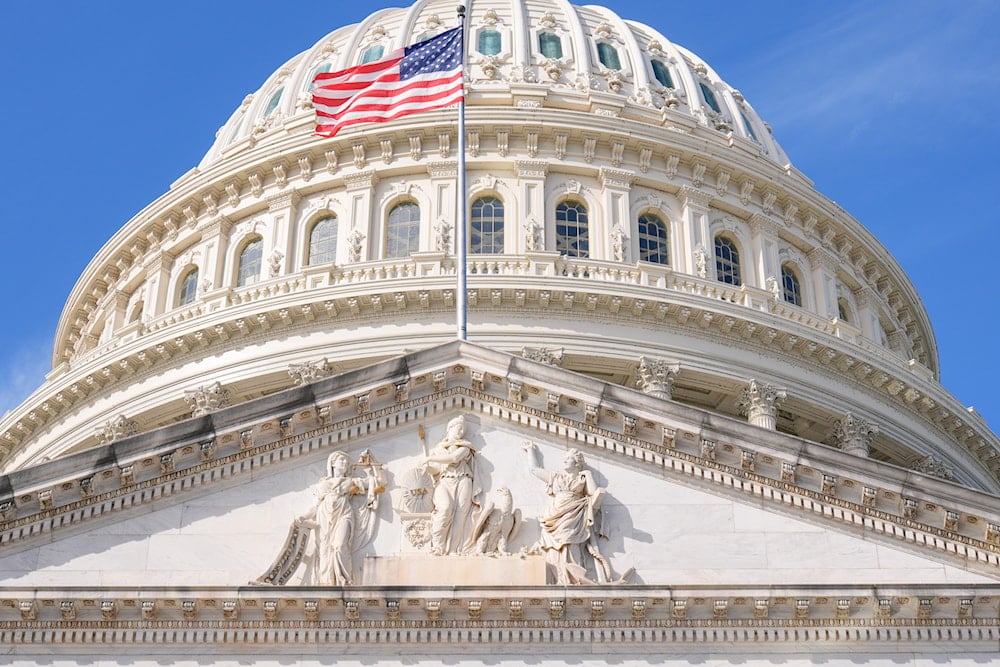US gov't shutdown braces to become longest in history
The 2025 US government shutdown nears a record as Congress remains deadlocked over Obamacare subsidies and federal funding measures.
-

The US flag flies atop the US Capitol on day 28 of the government shutdown, Tuesday, Oct. 28, 2025, in Washington (AP)
The 2025 government shutdown is just hours away from surpassing the previous record to become the longest in US history, a record that had been set during the 2018–2019 shutdown under President Donald Trump’s first term, when he eventually signed legislation to end it in the ninth hour of the 35th day.
Tuesday marks the 35th day of the ongoing fiscal deadlock, and with Democrats and Republicans in Congress still unable to strike an agreement, the standoff appears poised to spill over into a 36th day.
The 2019 shutdown stemmed from a dispute over funding for Trump’s border wall, while this time, the impasse centers on debates surrounding key Democratic spending priorities.
Key issues: Obamacare subsidies, fiscal year funding
For weeks, Republicans have been advocating for a short-term extension of fiscal year 2025 federal funding, known as a continuing resolution, which would maintain current spending levels and allow lawmakers until November 21 to reach an agreement on the fiscal year 2026 budget. The proposal is mostly devoid of unrelated policy provisions, except for an additional $88 million designated to bolster security for members of Congress, the White House, and the Supreme Court.
Democrats have maintained that they will oppose any federal funding measure that fails to include an extension of the enhanced Obamacare subsidies, which are set to expire at the end of 2025, a pandemic-era provision that many Republicans argue has outlived its necessity.
Senate Majority Leader John Thune and House Speaker Mike Johnson have indicated their willingness to consider a revised version of the subsidies, though they have rejected the idea of linking the matter to the broader funding negotiations.
The House approved the continuing resolution on September 19, and Johnson has kept his chamber out of session since that time in an effort to pressure Senate Democrats into accepting the GOP bill, which they have rejected 13 times since then.
'Possible to get something done'
Throughout the shutdown, Senate Republicans have pointed to various developments as potential reasons for Senate Democrats to agree to a deal, including the nationwide "No Kings" protests, federal workers going without paychecks, the start of open enrollment across the country on November 1, and now the looming possibility of the shutdown setting a new record later Tuesday night.
Sen. Mike Rounds noted that both Tuesday’s elections and the potential record-setting shutdown, seen by some as a protest against the president, could influence how much longer Senate Democrats choose to extend the standoff. "Here's the reality, they're at about 25% approval rating right now, and as one of their colleagues told me, the only way they can really go up is to show their base that they're fighting with the president, and that's what they're doing right now," he stated.
He added, "So once they get to the point where they think they made their point, then I think there's a possibility of actually getting something done."
Growing bipartisan talks offer hope, albeit limited
In the past several days, there has been more optimism in the Senate than during the rest of the shutdown, as a growing number of bipartisan talks have started to take place. Senate Majority Leader John Thune believed lawmakers were nearing a potential way to end the standoff, though no concrete steps have been taken to actually end the shutdown yet.
“Obviously there were a lot of conversations over the weekend, and hopefully that will bring about the desired result,” Thune told reporters.
Senate Democrats, led by Senate Minority Leader Chuck Schumer, still insist on securing a firm agreement on the expiring Obamacare subsidies and want Trump to play a larger role, and despite the growing optimism, that stance makes it likely that the House-passed continuing resolution will be rejected for a 14th time Tuesday morning.
When asked whether setting a new record would push lawmakers to end the shutdown, Sen. Roger Marshall said he believes it would require an external factor to make a difference.
Transport Secretary warns of 'mass chaos' due to shutdown
On his part, US Transportation Secretary Sean Duffy warned on Tuesday that if the ongoing government shutdown extends for another week, it could trigger “mass chaos” and potentially compel him to shut down portions of the national airspace to air traffic.
"If you bring us to a week from today, Democrats, you will see mass chaos, you will see mass flight delays. You'll see mass cancellations, and you may see us close certain parts of the airspace, because we just cannot manage it," Duffy told reporters in a press conference.

 5 Min Read
5 Min Read








